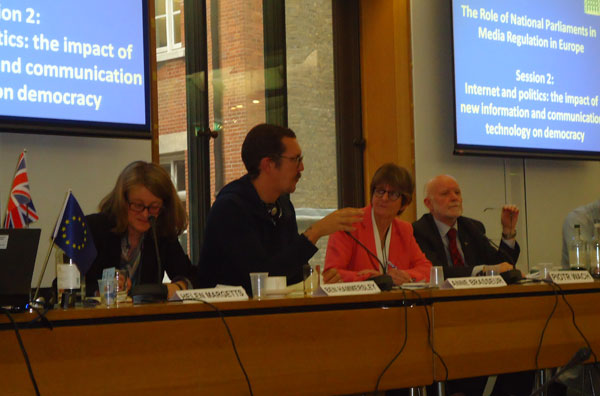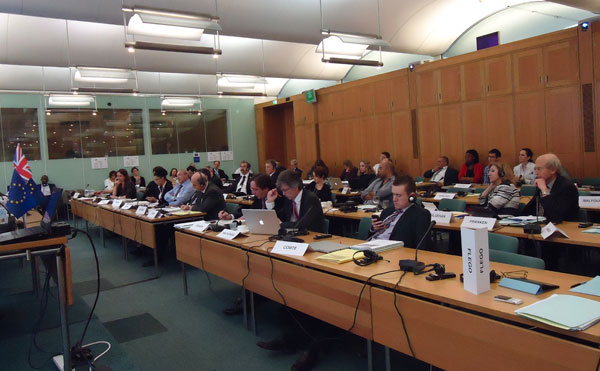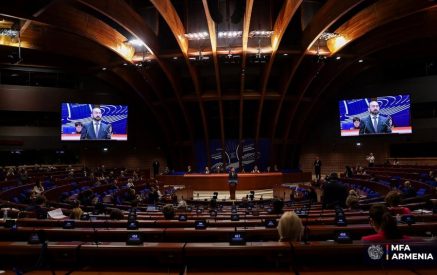More than just a game
To a looker-on, this scene might be funny. A group of people with a respectable appearance – wearing suits and, for the most part, glasses – is intently looking at the screen, on which now an animation, now a part of a video game for children is shown, and all this is accompanied by quite serious reports. This is how a conference on the role of national parliaments in media regulation in Europe organized by the PACE Committee on Culture, Science, Education and Media progressed in London yesterday morning. The first subject of the discussion was violence in the audiovisual media and its consequences on children and society. And in the process, they even recalled Tom and Jerry cartoons, how the mouse and the cat threw each other out of the window, they showed fragments from Super Mario, a video game, in which Mario eliminates animals one by one. According to the classification of Pan European Game Information (PEGI), even children under 3 years of age can watch such scenes of violence; violence is not accompanied by scenes resembling reality, it is sort of humorous. However, parts of video games for adults aged 18 and over shown by the same organization, in which violence, blood, and human suffering was reproduced almost naturally, made one of the women present groan: “When you look at this you are happy that you don’t have kids.” Whereas those who create video games have tried in recent years to create games with as natural, human characters as possible and with graphics that is more “realistic.” “This is one of the ways how violence becomes normal,” the rapporteur, Neil McLatchie, a representative of the University of Kent, asserted. He presented research results, according to which after playing such games, in which one should shoot and kill those who emerge in front of him, for 15 minutes, people really become more aggressive. “This is more than just a game,” he concluded. David Austin, a representative of the British Board of Film Classification, informed that they had already reached an agreement with the iTunes Store, according to which animation movies that didn’t correspond to the content classification would not be available on the iTunes Store, he also stated that they were engaged in negotiations with The Walt Disney Studios on the same issue. By the way, John Carr, a member of the executive broad of the UK Council on Child Internet Safety, had
informed earlier that they had signed a memorandum with all British mobile network operators, by which they would not allow those who use their services to visit pornographic websites and websites that advocate suicide and violence. However, in response to a question how one could explain to children that they should not use the content that is not intended for their age group, David Austin attached particular importance to the role of education and schools.
Read also
A biased broadcaster may lose its license
In the afternoon, the commission started to discuss interconnection between the internet and politics, the impact of the internet and new communication tools on politics and democracy. The first person to make a speech was John Whittingdale, the chairman of the Select Committee on Culture, Media and Sport of the British House of Commons. He presented what legislation there was that discouraged journalists from abusing freedom of speech. He stated in part that broadcasters didn’t have a right to present only one party’s opinion, take a biased attitude, otherwise they might not only be fined, but also lose their broadcast license. It happened, for example, to Press TV, a TV channel, a year and a half ago, because, according to Whittingdale, it was engaged in exceptionally political propaganda and actually was Iran’s political mouthpiece in Great Britain. (By the way, during the conference, Ben Hammersley, a member of the EU High-Level Group of Experts on Media Freedom and Pluralism, made an interesting statement that old media had been based on deficit, for example, on the deficit of frequencies.) The committee chairman noted that newspapers’ circulations became smaller and smaller day by day, and they might not exist in 5-10 years at all. “And we continue to think how to regulate their activities. Representatives of local media complain that they struggle for existence, meanwhile we create additional financial problems for them.” And in this context he suggested that they focus more on online information agencies. In response to an observation of Aravot that one couldn’t regulate everything that was published online, since in our country, in particular, one often didn’t even know who published the given online information agency, John Whittingdale said that he had discussed the Armenian mass media with the Minister of Foreign Affairs of the Republic of Armenia. And he was aware of insufficient transparency in the financing of our information agencies. “And we demand to clarify whom the given information agency belongs to.” Let us note that John Whittingdale is a member of the Armenian-British parliamentary group, he visited Yerevan in 2011 and stated at a press conference: “We visited the Armenian Genocide Memorial and saw evidence about what had happened. When I am back to Britain I will tell about what I have seen, will share my impressions with my colleagues.” He also said that he intended to organize an exhibition in the British parliament to inform MPs about the Armenian Genocide. It was not in the committee’s competence and time for Q&A was limited, so we didn’t manage to find out whether he had carried out his intention. The committee will continue its work today.
ANNA ISRAELYAN
London
Aravot Daily























































